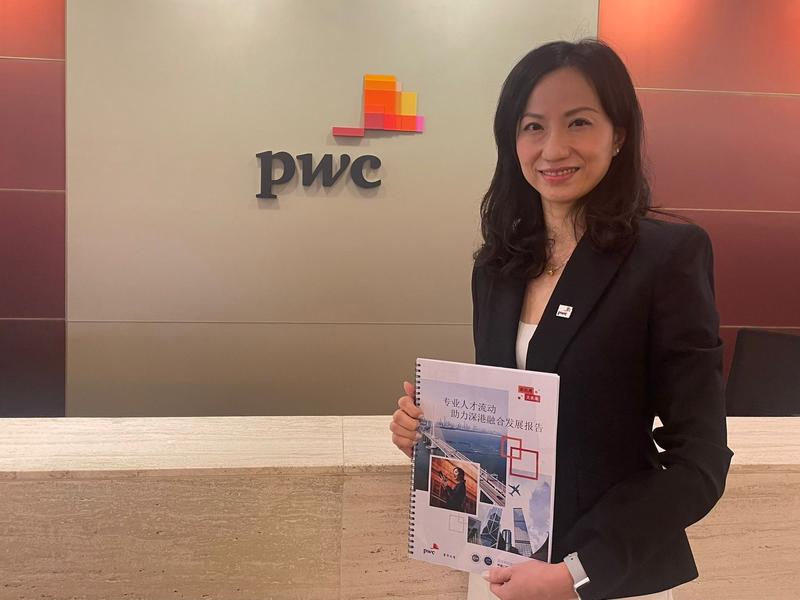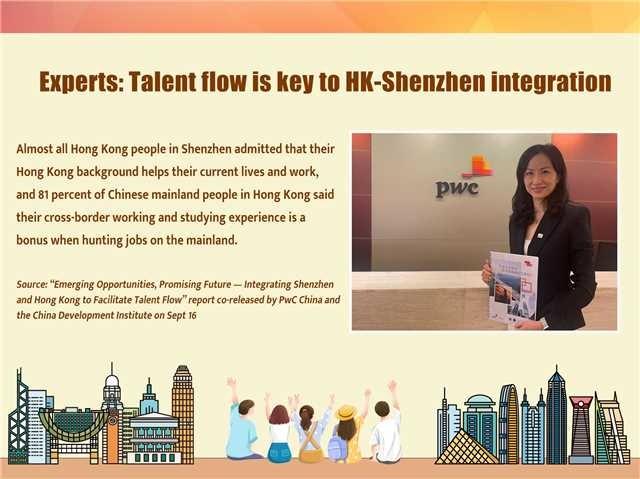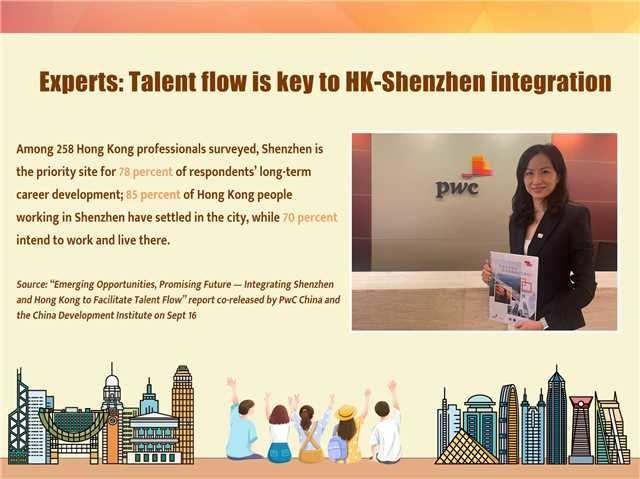 Loretta Fong Wan-huen, president of the Hong Kong Institute of Certified Public Accountants and the Hong Kong and Greater Bay Area ESG services leader of PwC China, poses for a photo after the news conference on the newly released report "Emerging Opportunities, Promising Future — Integrating Shenzhen and Hong Kong to Facilitate Talent Flow". (PHOTO PROVIDED TO CHINA DAILY)
Loretta Fong Wan-huen, president of the Hong Kong Institute of Certified Public Accountants and the Hong Kong and Greater Bay Area ESG services leader of PwC China, poses for a photo after the news conference on the newly released report "Emerging Opportunities, Promising Future — Integrating Shenzhen and Hong Kong to Facilitate Talent Flow". (PHOTO PROVIDED TO CHINA DAILY)
Talent flow is crucial to Hong Kong’s and Shenzhen’s mutual development, experts said during a news conference, as they called for more measures targeting cross-border recognition of various professional qualifications to deepen the region’s integration.
PricewaterhouseCoopers China released the report “Emerging Opportunities, Promising Future — Integrating Shenzhen and Hong Kong to Facilitate Talent Flow” on Friday amid the central government’s intensified efforts — about 50 policies enacted within two years — on creating favorable conditions for talent movement within the Guangdong-Hong Kong-Macao Greater Bay Area.
James Chang, managing partner of regional economic clusters and south markets at PwC China, said the flow of professionals between Shenzhen and Hong Kong could bridge culture gaps, and could even make those people regard their workplace as second hometown
James Chang, managing partner of regional economic clusters and south markets at PwC China, said the flow of professionals between Shenzhen and Hong Kong could bridge culture gaps, and could even make those people regard their workplace as second hometown.
ALSO READ: HKMA: Strategies to develop a deep offshore RMB market
The report revealed that among 258 Hong Kong professionals surveyed, Shenzhen is the priority site for 78 percent respondents’ long-term career development; 85 percent of Hong Kong people working in Shenzhen have settled in the city, while 70 percent intend to work and live there.
A total of 66 percent and 47 percent of Hong Kong people working in Shenzhen and Hong Kong respectively said Shenzhen’s talent policies have a significant impact on whether Hong Kong residents go there for jobs. However, more than half of Hong Kong people said they don’t know about or only hear of Shenzhen’s talent policies.

Around 40 percent acknowledged the difference of recognition of professional qualifications between the two cities. Cultures, industry work standards and taxation are another three top distinguishing characteristics, according to the report.
Chang said Hong Kong and Shenzhen should set up pilot programs based on specific talent needs to benefit the cross-border workers, and move further to open up mutual professional qualification recognition.
ALSO READ: Hong Kong residents' income down 1.2% in Q2
“For example, Hong Kong in the near future could consider issuing a special working visa for Chinese mainland people who will work in its Northern Metropolis”, a planned development bordering Shenzhen that the Hong Kong government aims to make into an innovation and technology hub, Chang said. The hub will require many technology professionals, which Hong Kong lacks, he added.
In terms of institutional convergence, Loretta Fong Wan-huen, president of the Hong Kong Institute of Certified Public Accountants, said that “Adding English as an examination language and broadening the scope of practice” could develop the system of mutual recognition of qualifications.

Fong, who is also Hong Kong and Greater Bay Area ESG services leader of PwC China, said that environmental, social and governance, and related sectors will play an important role in the future integration of talent from Shenzhen and Hong Kong.
“The Hong Kong government this month announced plans to provide cash subsidies and to relax immigration requirements in order to attract fintech and ESG talent,” she added.
Guo Wanda, executive vice-president of the China Development Institute, said that enhancing mobility is the key to fostering talent development in Shenzhen and Hong Kong.
ALSO READ: Qianhai spruces up
“This mobility can drive growth and industrial upgrading, but the process of innovation is challenging and complex. …Further research and implementation are required to address issues regarding qualifications, taxation and customs clearance,” Guo said.
Shenzhen this year has allowed overseas professionals, including tax accountants, doctors and registered architects, to register and practice in accordance with the “List of External Professional Qualifications for Practicing Facilitation of Shenzhen Municipality”.
In July, the first batch of lawyers from Hong Kong and Macao were qualified to provide legal services in the mainland cities of the Greater Bay Area after passing the new exam.
tianyuanzhang@chinadailyhk.com


